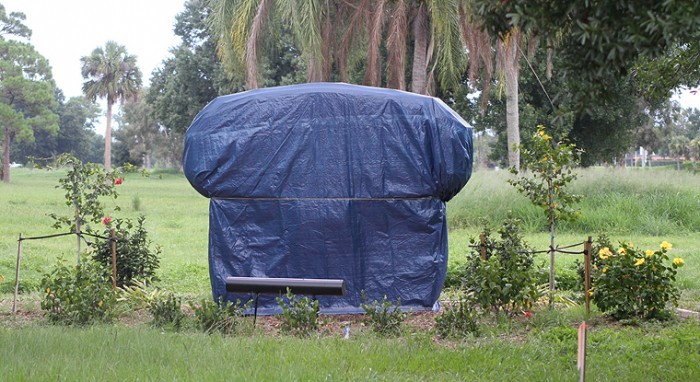
INDIAN RIVER COUNTY – Blue tarps are covering the recently installed signs declaring “Vero Beach Sports Village” at the corner of 43rd Avenue and 26th Street in protest over a dispute between Minor League Baseball and Indian River County.
“This is the last straw,” said Minor League Baseball President Pat O’Conner, explaining that he is tired of the run-around he believes the county’s administration is giving him.
Whether O’Conner plans to pull out of his lease with the county remains to be seen. And when asked what could come next, he said he was considering all his options.
At issue is approximately $50,000 O’Conner believes the county owes Minor League Baseball for various improvements at the Vero Beach Sports Village complex, including the new signs.
County Attorney Alan Polackwich and County Budget Director Jason Brown agree that the county should not pay back Minor League Baseball for the signs as they were not a replacement, nor where they an approved improvement as required under the lease agreement.
“It’s a conscious decision to be cheap,” O’Conner said.
He said that since Minor League Baseball took over complex, he has put $1.5 million into the community, hired 30 to 40 people and put a “lot of butts in hotel rooms.”
He said he lost $1 million last year at the Vero Beach Sports Village and is on track to lose another $500,000 this year.
“I’m not going to lose $50,000 quietly,” O’Conner said, referring to the reimbursement he believes he’s owed.
When Indian River County and Minor League Baseball signed the lease agreement in 2009, the county established three funds for the Vero Beach Sports Village – $50,000/year advertising, $100,000 for rebranding expenses and $2 million for capital improvements, replacements and repairs.
“We’ve long-since paid that,” Polackwich said of the $100,000 rebranding funds, which were meant for signs, banners, canopies and otherwise replacing anything that said “Dodgers.”
O’Conner doesn’t dispute the $100,000 being spent – but that his $50,000 could come from the $2 million Capital Reserve Account.
Polackwich said that if it had been Minor League Baseball’s intent to submit the signs as an “improvement” under the Capital Reserve Account, the proposal would have needed to be approved prior to the signs being built.
“They’re using a narrow definition, one we disagree with, to trip me up,” O’Conner said.
The signs, according to O’Conner are meant more for community identity than for Minor League Baseball’s business. He explained that anyone in the MiLB arena knows where the village is and doesn’t need a sign to prove it.
Polackwich said he would not have had a problem if MiLB had tried to replace dilapidated, aged signs.
“I could understand that,” he said.
O’Conner said Polackwich is missing a key point – the Vero Beach Sport Village signs were needed in order to replace the Dodgertown signs, which the county no longer had permission to keep up.
“We refused to do it,” he said of keeping the signs up, though the county seemingly did not mind leaving them in place. O’Conner added that doing so would have been a violation of the Dodgers’ copyright.
“The signs they had up had to come down,” he said.
So, because the county seemingly doesn’t see the Vero Beach Sports Village signs as an improvement to the county-owned complex, and because Minor League Baseball has paid for and owns the signs, O’Conner said he could do with them as he sees fit.
And, for now, he plans to keep them covered in blue tarps.






